
NEWSLETTER
May 2024

Welcome to the Maina Foundation Newsletter!
10,000 Steps a Day: Fact or Fiction
By Manju Soni
Hi Friends,
I hope, like me, your spirits are soaring now that summer is upon us. And with better weather comes more outdoor activities.
Which means more walking… the magic number of 10,000 steps a day.
Where does this number come from?
It seems to have originated from Japan in the 1960s, as a marketing campaign for an early prototype of a pedometer.
In the lead up to the 1964 Tokyo Olympics, Dr Iwao Ohya, head of one of Tokyo's biggest clinics, was concerned at the low levels of physical activity in Japan. He commissioned Tokyo engineer and clockmaker, Juri Kato to create a pedometer, which was eventually called manpo-kei (meaning "10,000 steps meter" in Japanese).
That, apparently, was how the "10,000 steps a day" regimen was born.
Is there any truth to the claim of better health with 10 000 steps, or was it just a great marketing campaign?
Although there’s no actual data from this initial discovery, If the aim was for wearers of the manpo-kei to lose weight, it’s likely they did by the sheer act of increasing their steps per day.
Does this increase in activity lead to a longer life?
Apparently, it does. In a 2022 publication—Daily steps and all-cause mortality: a meta-analysis of 15 international cohorts—researchers analyzed 15 studies, with start dates between 1999 and 2018.
In a total sample of 47 471 participants with a median study follow-up time of 7.1 years (range 2.7–13.5 [IQR 4.3–9.9], higher quartiles of steps per day were associated with a reduced risk of mortality in the overall sample compared with the lowest quartile of steps per day.
Why does walking more result in better health?
The answers may be fairly obvious.
- Heart health: Walking gets your blood pumping, reducing the risk of heart disease. It lowers blood pressure and improves circulation. Your heart will thank you!
- Mood Booster: Physical activity releases the feel-good hormones, endorphins. A daily walk can reduce anxiety, depression, and stress. Hello, happy vibes!
- Weight Management: Walking helps burn calories and can aid in maintaining or losing weight. Plus, it revs up your metabolism.
- Brain Power: Regular walking improves cognitive function and memory. It even lowers the risk of cognitive decline and diseases like Alzheimer’s.
- Social Steps: Walking is a fantastic way to bond with friends, family, or doggy companions.
Is walking 10 000 steps the only way to get fit?
I have to be honest, 10 000 steps are almost 5 miles and would take me, at a rapid pace, approximately 1.5 hours to achieve. That’s a good chunk of time, even if some of those steps are done while going about my normal day.
I was therefore thrilled to come across this 2018 article 'Forget walking 10,000 steps a day' where Michael Mosley, with Prof Rob Copeland from Sheffield Hallam University asked a group of volunteers to either do 10 000 steps per day or the ‘Active 10’ where volunteers simply aimed to do three brisk 10-minute walks a day.
This being a short study, the only metrics measured were how much activity the participants did. The result was that even though the Active 10 group spent less time actually moving, they spent more time getting out of breath and increasing their heart rate.
How do I include more steps in my day?
Some activity is better than no activity
The U.S. Department of Health and Human Services recommends 150 minutes a week of moderate-intensity exercise, such as brisk walking. But you don't have to jump feet-first into the 150-minute goal. Start where you are and gradually increase your activity week by week.
Those 150 minutes a week can be divided in many different ways. Some people aim for 30 minutes of exercise five days a week. Others fit in 10 minutes of exercise several times a day.
If your walking pace isn't speedy enough to qualify as moderate-intensity exercise, you can build up the intensity slowly over weeks or even months. In fact, adding any regular activity to your routine is beneficial.

Tips to Hit Your Step Goal
Feeling inspired? Here are some fun ways to make those 10,000 steps fly by:
- Take the dog for a walk. If you don't have a dog, volunteer to walk dogs at an animal shelter. Or combine your activity with social time by joining a friend to walk his or her dog.
- Try music. A bouncy or techno beat or something with a strong rhythm can make activity more enjoyable and help motivate you to walk farther or faster.
- Include the family. Instead of an afternoon movie, go for a walk or hike together.
- Park Far Away: Choose the farthest parking spot or get off the bus a stop early.
- Take the stairs. Even going down the stairs counts as steps and burns calories.
- Schedule workday walks. Put reminders in your calendar for short walking breaks.
- Deskercise: Set hourly reminders to stand up and do a desk workout (no, do not twerk on top of your desk!). Take a short walk around your office or home.
- Walk and Talk: Take a call or a meeting on the go and rack up those steps.
- Walk while waiting. Take a walk instead of sitting when you're early for an appointment or waiting for a flight.
- Explore: Discover new walking trails or take a different route.
- Step It Up: Invest in a good pedometer or fitness tracker to keep track of your progress and celebrate milestones
Final Steps
Remember, every step counts towards a healthier you. So, put one foot in front of the other and enjoy the journey. After all, the road to wellness is best traveled one step at a time.
Thank you for reading and happy stepping!
Manju Soni (she/her) (pen name: M. J. Soni) is a former eye surgeon turned author. She is the author of Defying Apartheid, her debut nonfiction book that captures her experiences of being a young activist against apartheid. Her short fiction and essays has appeared in Ellery Queen Mystery Magazine, Akashic Books, Apeiron Review and The Establishment. She’s a member of Crime Writers of Color and Sisters in Crime (National and Connecticut.
News!
In some exciting news, Maina Foundation’s collaboration with programs in India have flourished and reached many more women in need.
Here are heartening words from some of the health workers quoted in a recent 10-year overview of Maina Foundation’s collaboration with the Department of Community Medicine at K.J.Somaiya Medical College and Research Centre.
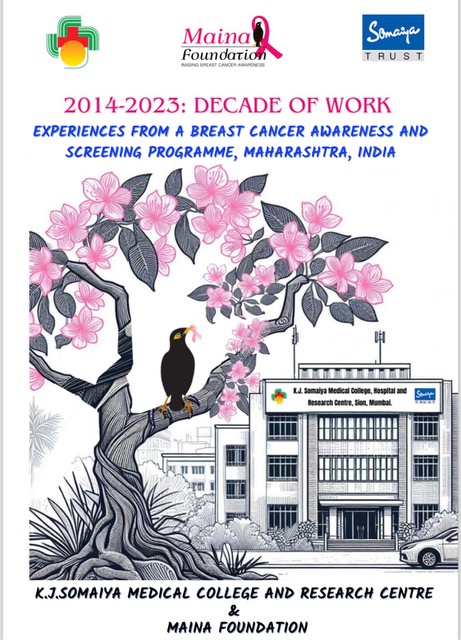
Some statistics of breast cancer in India:
- Breast Cancer is the most common cancer in India.
- In year 2022, number of newly detected breast were 192.020 and contributed to 13.6% of all the cancer cases.
- Breast cancer contributes to almost one fourth of all cancer cases in females in India. In the year 2022, it constituted 26.6% of all the new detected cancer cases in women in India.
- 98,337 deaths were due to breast cancer which accounts for 10.7% of all the cancer deaths in India in year 2022.
- The 5-year prevalence of new and old breast cancer cases was 5,26,248.
- In India, breast cancer occurs at a younger age than the western countries.
- Early age of onset, diagnosis at late stage of disease and delayed initiation of treatment lead to poor survival rate in India.
- According to the World Cancer Report 2020, the most efficient intervention for Breast Cancer control is early detection and rapid treatment.
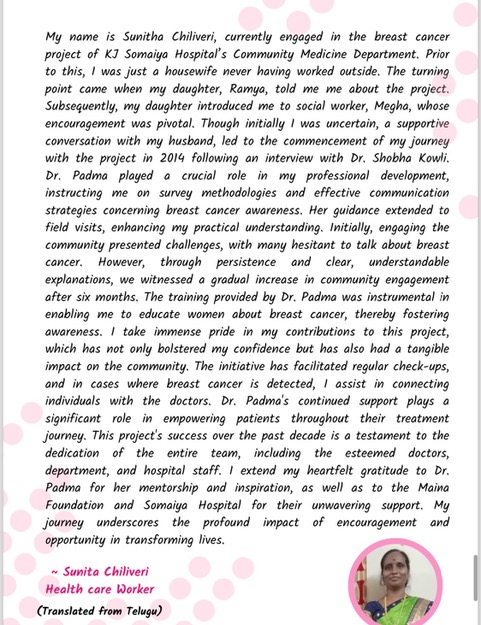
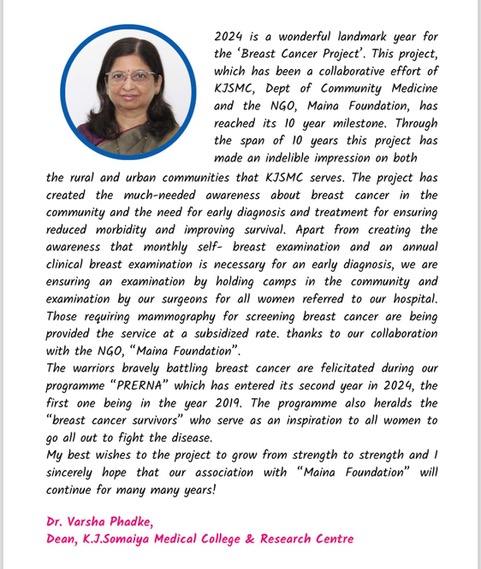


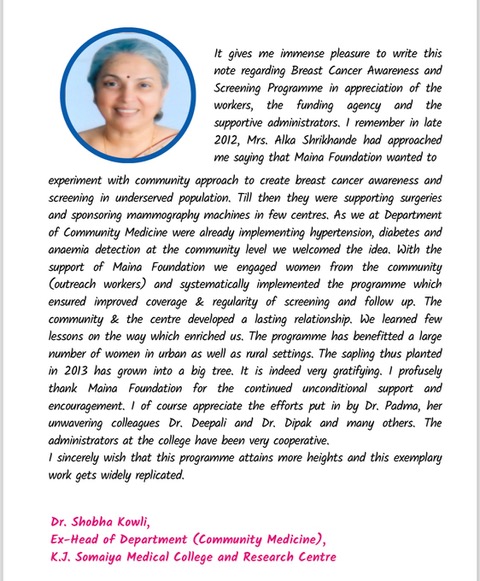


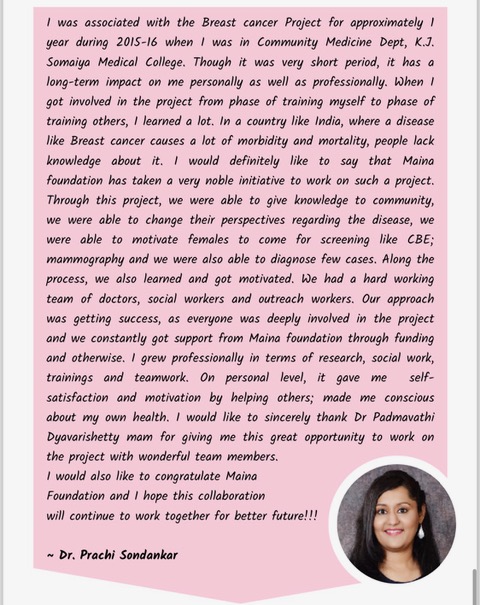

With these words from our committed partners, we thank you for your continued support!
For more information on Maina Foundation, and to help its mission, go to https://mainafoundation.org or contact us at 860-434-3985 or info@mainafoundation.org
SAVE A LIFE - DONATE NOW
Donations can also be mailed to:
8 Peppermint Ridge, Old Lyme, CT 06371, USA
